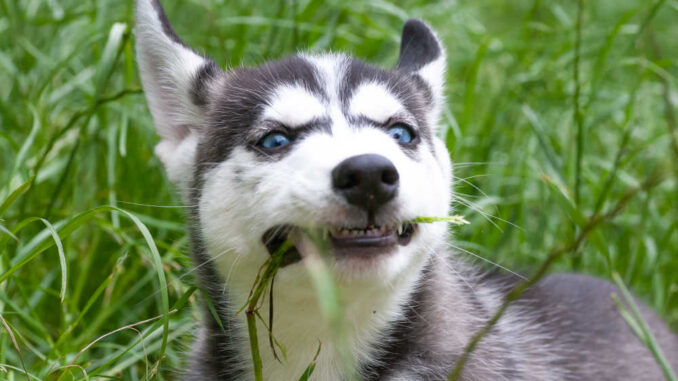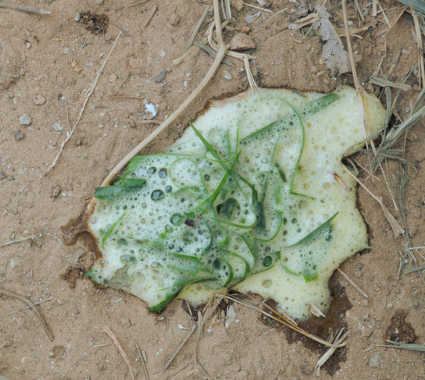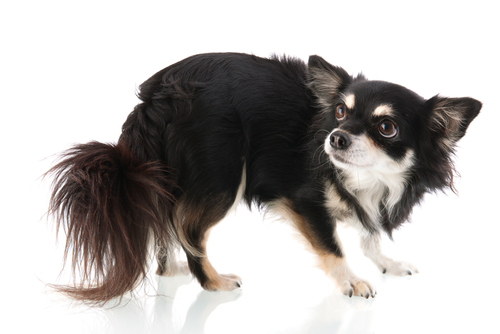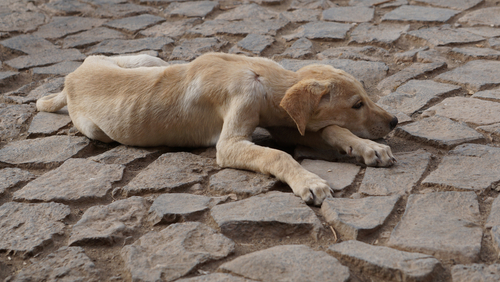
This article was updated on May 4th, 2023
It is very common indeed for dogs to eat grass and most do it their whole lives, on and off. Owners often mention it to me in passing during a consult, wondering why it happens and if they should be concerned.
For most of our furry friends, grass eating is just something that they do and it won’t cause them any issues. However, there are some aspects of grass eating that owners should be aware of. For a small number of dogs, it can be a sign of an underlying problem. For others, it can even cause a medical issue.
Is a dog eating grass and vomiting a reason to be worried?

Actually, grass eating and vomiting tend to go hand in hand. For some dogs, they’ll eat grass and bring it back up soon after. Many experts believe that this carries advantages. It can help dogs bring back up toxic substances they recently ate, or parasites residing in their stomach.
When a healthy dog eats grass and vomits, they usually feel much better soon after and continue to act as normal. Conversely, if a dog who is poorly eats grass and vomits, we’d expect other signs such as lethargy, food refusal and persistent vomiting.
What are the reasons why dogs eat grass & vomit?
1. A tasty treat!
Dogs enjoy the sugary taste of grass, particularly in the Spring time when it is long. Some simply enjoy the flavor, as well as the texture and ‘crunch’. Dogs can form a habit of munching on grass now and then. This interesting study detailed how healthy dogs are more likely to eat grass when hungry.

What to do in this case: These dogs will be otherwise well, with no symptoms and they generally don’t vomit back the grass. We do not need to stop their grass eating, but if it is excessive, we should distract them with something else to do.
2. A cure for their nausea
For some dogs, when they have excess bile in their stomach or they feel nauseous, they will instinctively eat grass in an effort to be sick. This is their way of trying to make themselves feel better.
When a poorly dog is doing this, we should have them examined by the vet, to determine why they are unwell. Persistent vomiting can lead to salt imbalances and dehydration. Dogs can benefit from interventions such as antacids, anti nausea medicine and fluid drips.
For dogs who tend to vomit bile in the mornings with grass, this can be a sign of bilious vomiting syndrome. This is most common in smaller breeds.
What to do in this case: It can help to spread meals out throughout the day and to ensure they’re being fed last thing at night and first thing in the morning.
3. A sign of stress
When a dog is under stimulated or under exercised, they may pick up some bad habits. These can include digging, barking or even excessive grass eating. This is especially true for dogs left outside for long periods by themselves.
For some dogs, it is simply a way to ‘fill the time’. For others, it is an attempt to signal to their owner that they’re unhappy or to try and get their attention.

What to do in this case: If you think your dog is eating grass out of boredom or stress, work hard to provide a life for them that is fulfilled and enriched. Dogs crave company and mental stimulation, as well as plenty of exercise.
4. A diet that is lacking
If a dog’s diet is not providing all of the nutrition they need, they may start to eat things other than their food. This can include grass, particularly when their diet lacks in fiber. Owners may also find their dog trying to eat other things such as wood, rocks and feces.
As complete commercial diets are balanced, it is less common nowadays for a dog’s diet to be nutritionally lacking. However, it is something we see when owners attempt to feed a home-made diet, without researching the ingredients needed. For those who wish to make their dogs’ food from home, they should consult with a nutritionist first.
For some dogs, their diet is balanced but they’re unable to break it down or use the nutrients as they should. This can be the case with certain malabsorptive disorders such as EPI (exocrine pancreatic insufficiency) or IBD (inflammatory bowel disease). Other symptoms may include diarrhea, weight loss and lethargy.

What to do in this case: Meet with your veterarian. When presenting with these signs, your vet will run a range of tests (including blood tests, stool analysis and endoscopy), in order to reach a diagnosis.
Other than vomiting, what are the consequences of dogs eating grass?
The dog’s digestive system is not really set up to digest grass, and there can be knock on effects and complications.
• Diarrhea. With copious grass eating, particularly if the grass is lush and has a high moisture content, dogs may experience short bouts of diarrhea.
• Dehydration. Dehydration is possible if the grass eating causes a dog to vomit a lot, particularly if they also develop diarrhea. However, most dogs who eat grass and vomit will not do so to the extent that their hydration is affected.
• Foreign bodies. Due to the shape of long grass blades, they can potentially get stuck in the throat. This causes a dog to retch and gag and can be quite uncomfortable for them. Sometimes, these blades of grass will need to be removed by a vet while the dog is sedated.
• Toxicity. Though grass is not toxic, it may be contaminated with fertilizer or weedkiller. These chemicals can be toxic to dogs, so we should never allow them to eat grass if we think it may have been recently treated.
• Parasites. Dogs can pick up parasites from grass and soil, particularly if other dogs pass stool nearby. Signs of internal parasites include diarrhea and excess hunger, as well as weight loss and a dull coat. For all dogs, it is sensible to keep them up to date with a broad acting de-wormer.
Home remedies to try when your dog eats grass & vomits
Best Products to Help
1. Glandex
A fiber supplement such as Glandex may be worth a shot, particularly if you feel your dog’s diet could be low in fiber. Other side effects of a low fiber diet can include chronic loose stool and anal gland problems.
I frequently recommend this product for my patients, and owners report that their dogs really enjoy the taste of the powder when it is mixed in with meals. The added probiotics are also great for supporting gut health. Available on Amazon here:
No products found.
2. Engaging toys!
As grass eating is a result of boredom for so many, giving your dog things to do can help remedy the problem. Try to not leave them alone for prolonged periods, and to give them something to do when they are by themselves.
Food puzzles like Kongs are a great investment. Kongs are durable and work well, even for heavy duty chewers and large breeds. They can be filled with fiber rich foods like sweet potato and pumpkin, for a double pronged attack! Available on Amazon here:
- Instinctual Needs: The KONG Extreme black rubber toy helps satisfy dogs' instinctual needs and provides mental stimulation; toy helps solve chewing, teething, boredom, crate training, digging, barking, and more
When to seek veterinary care
As discussed, grass eating is very common and is generally not cause for concern. However, if your dog is suddenly eating a lot more grass or if they develop additional symptoms, it is time to have them checked out.
Frequently Asked Questions
Are all grasses toxic to dogs?
No, grass is not toxic to dogs. However, if the grass has been treated with chemicals, this could lead to toxicity.
Can I use home remedies to cure my dog?
Oftentimes, we don’t need to ‘cure’ our dogs grass eating and can just accept it is something they do from time to time. However, if they do it a lot, we might want to try adding more fiber to their diet and keeping them busy with other things to do.
Disclaimer: This website's content is not a substitute for veterinary care. Always consult with your veterinarian for healthcare decisions. Read More.



Be the first to comment